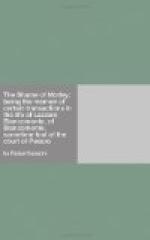“Begone!” he growled at the lad, “I will have Boccadoro, there, to help me arm.” And with a poor attempt at mirth—“The act is a madness,” he muttered, “and so it is fitting that folly should put on my armour for it. Come with me, you,” he bade me, and I, obediently, gladly, went forward and up the wide stone staircase after him, leaving the page to speculate as he listed on the matter of his abrupt dismissal.
I read the Lord Giovanni’s motives, as clearly as if they had been written for me by his own hand. The opinion in which I might hold him was to him a matter of so small account that he little cared that I should be the witness of the weakness which he feared was about to overcome him—nay, which had overcome him already. Was I not the one man in Pesaro who already knew his true nature, as revealed by that matter of the verses which I had written, and of which he had assumed the authorship? He had no shame before me, for I already knew the very worst of him, and he was confident that I would not talk lest he should destroy me at my first word. And yet, there was more than that in his motive for choosing me to go with him in that hour, as I was to learn once we were closeted in his chamber.
“Boccadoro,” he cried, “can you not find me some way out of this?” Under his beard I saw the quiver of his lips as he put the question.
“Out of this?” I echoed, scarce understanding him at first.
“Aye, man—out of this Castle, out of Pesaro. Bestir those wits of yours. Is there no way in which it might be done, no disguise under which I might escape?”
“Escape?” quoth I, looking at him, and endeavouring to keep from my eyes the contempt that was in my heart. Dear God! Had revenge been all I sought of him, how I might have gloated over his miserable downfall!
“Do not stand there staring with those hollow eyes,” he cried, anger and fear blending horridly in his voice and rendering shrill its pitch. “Find me a way. Come, knave, find me a way, or I’ll have you broken on the wheel. Set your wits to save that long, lean body from destruction. Think, I bid you.”
He was moving restlessly as he spoke, swayed by the agitation of terror that possessed him like a devil. I looked at him now without dissembling my scorn. Even in such an hour as this the habit of hectoring cruelty remained him.
“What shall it avail me to think?” I asked him in a voice that was as cold and steady as his was hot and quavering. “Were you a bird I might suggest flight across the sea to you. But you are a man, a very human, a very mortal man, although your father made you Lord of Pesaro.”
Even as I was speaking, the thunder of the besiegers reached our ears— such a dull roar it was as that of a stormy sea in winter time. Maddened by his terror he stood over me now, his eyes flashing wildly in his white face.
“Another word in such a tone,” he rasped, his fingers on his dagger, “and I’ll make an end of you. I need your help, animal!”




